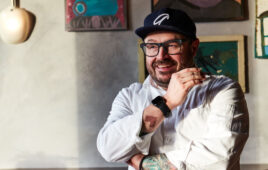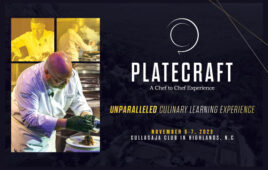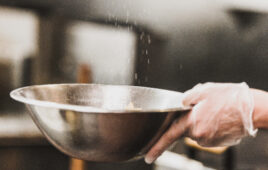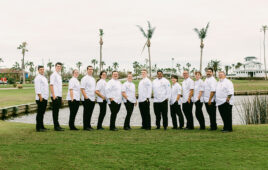 |
| Rick Waters’ childhood experiences with “natural gourmet” fare have helped him open new culinary doors for Peachtree Club diners. |

But while many chefs have taken interesting paths to the culinary arts, few can top Rick Waters’ story.
Rick grew up on a farm in rural Georgia, where his Mom would preserve as many foods from their vegetable garden as she could, and prepare delicacies like braised pork shanks and pâté. And after the fall pig slaughter, Rick’s Dad would make what he called “Hogs Head Cheese.”
“It was not until much later in life,” Rick says now, “that I saw things like pâté and pork shanks on a restaurant menu, and realized that I had grown up eating ‘gourmet.’ I thought to myself, I can make these dishes—and after learning the culinary vocabulary, I was on my way.”
Today, Rick is Executive Chef at The Peachtree Club in Atlanta, where he teams with General Manager/Owner Chris Swinn and the rest of the club’s F&B staff to prepare and serve some very inventive club cuisine. Rick’s Southern cooking style fits right in at the downtown dining club, where members and their guests from around the world sample his different spins on classic comfort foods.
It was a pleasure to have Rick give us his insights recently about how he develops a menu that keeps his club competitive with a very demanding restaurant scene in Atlanta.
Q Rick, how has being raised on the farm given you a greater appreciation for fresh, organic products, and remained an influence on you to this day?
A Seventy-five percent of the food that I ate growing up came from a three-acre garden from out back of our house. We also raised most of our pork and chicken. We were taught as children that taking care of the land and learning to feed ourselves were just as important as reading, writing or math.
My mother was a great cook and I can still remember the smells from our kitchen. She would gather new potatoes and baby turnips from the garden and store them away, waiting for the first cold snap when we would slaughter a pig. She would braise the pork shanks with these baby vegetables. I can honestly say that it’s hard to find pork with that same old-world taste or that’s as moist and flavorful as what came from our farm. I also miss the taste of a vine-ripened tomato, and the sweet fragrance of an heirloom cantaloupe.
I am sure that this background is why I’m now committed to the idea that if we take the time and care to cook using natural, organic ingredients, grown nearby and in season, we will do a lot to renew our communities, ourselves and our health.
Because of this commitment, the members of my club have come to trust me about the food I serve to them. We watch the trans-fats in what we buy, we order organic, natural, and seasonal ingredients when available, and we use cooking methods that retain as many vitamins as possible. In a world of fast food and fast living, I think it’s important that we try to slow down, empty our pantries of pre-packaged food, and teach those we’re feeding about proper nutrition and the origins of the food we all enjoy.
 |
| The club’s great view from the 28th floor of its building in downtown Atlanta provides a constant reminder to serve food that’s equally inspiring. |
Q Chef, I know you dine out a lot and follow the restaurant scene in Atlanta very closely. What is going on around your club that has affected your business and inspired you to do some different things?
A As Atlanta has grown up, so have its restaurants. They are moving away from theme-driven concepts to ones that are chef-driven. And that’s helped to open many new doors for the rest of us.
It’s great to now be able to say that Coca-Cola is no longer Atlanta’s greatest contribution to gastronomy. In the past few years, the dining scene here has exploded. A number of innovative chefs who had left Atlanta to go to other “food capitals” have returned. Because of that and the city’s highly ethnic population, you can now find almost anything here.
Some of the hottest trends we’re now seeing in this area are small plates and Southern cuisine with a contemporary twist. It’s now OK to serve collard greens and grits on fine china. After 9/11, comfort food made a strong comeback, and I think it is here to stay.
Q As a chef who prides himself on using local ingredients, how do you procure great products, like your Appalachian trout, while in a city location?
A We have a local charter of “Slow Food,” and I try to use as many of their farmers as possible. Atlanta also has a number of local farmer’s markets and organic specialty markets. There is a wonderful trout farm in North Georgia, where the trout is cleaned and delivered the same day it is caught. We also have an organic lettuce farm about 20 miles from the city, where we get fresh micro greens and salad greens. It takes a little more time and effort to search out local products, but the end results are worth it.
It does take a bit more planning, as most of the smaller growers have very limited delivery dates. But they also offer great buys when they need to move specialty items quickly.
Q You don’t have the “same old” club fare by any means. But that can make it tougher to generate steady sales or large enough margins. How have you been able to sell unique creations, instead of oversized beef cuts from overpriced beef programs?
A I will take that as a compliment. We do try to be different without being over the top. I have to give a lot of the credit in this regard to our Director of Operations, Dale Hennis. He’s been with the club since its onset in 1989, and has a great relationship with the members. We work closely together on the menus, and he has a great feel for which items will work, and which will not.
In general, I try to take the “familiar” and find a way to make it new. For example, lump crab is always a house favorite. The members trust crab; it’s grounded, and safe. But I’ve tried to give it a new twist by layering it with tomato aspic, sliced cucumber, and crushed avocado topped with micro arugula and preserved lemon.
Overall, we try to keep the menu straightforward, without confusing culinary terms. I think the key is playing to the emotions that can be connected with food—keep it clean and familiar, with an element of whimsy and fun.
Q How does your situation differ from what most chefs have to deal with in the club industry?
A We are a privately owned club with an owner/general manager. We meet as executive managers to discuss changes in the menu, special events, and the overall direction of the club. It is wonderful working under this system, because we all share a common goal: the future welfare of the club. And we know that meeting this goal depends on members’ satisfaction.
While we don’t have formal committees, we do solicit member feedback and track the flow of business as a guide to member happiness. Chris Swinn, our general manager/owner, has an extensive background in food, and is a major supporter of the culinary team.
Q Finally, Rick, I know your club is on the 28th floor of a building in downtown Atlanta, which gives your diners a panoramic view of the city. Isn’t it tough to always have your food, no matter how great it is, compete with that kind of distraction?
A The great view is one of the things that makes our club special, so we never see it as a distraction or want to do anything to interfere with members and guests getting full enjoyment from it. But many times I’ve attended events at a beautiful facility and been disappointed with the food. I always see our view as a reminder that I never want that to happen to any members or guests at The Peachtree Club. As long as what we serve is compatible with the view, and doesn’t take a back seat to it, I see that as success. C&RB
 |
Jerry Schreck is a member of the Club & Resort Business Advisory Board. Know someone you’d like to have Jerry interview for a “Chef to Chef” conversation in a future issue? Send your suggestions to [email protected] |




